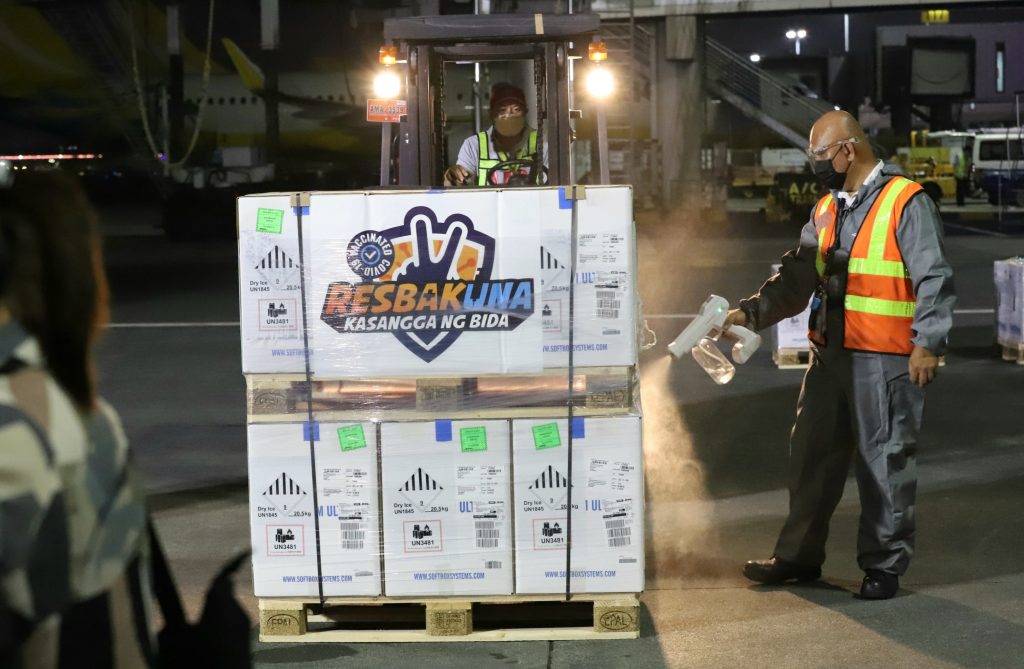News
Liability of LGUs over vax spoilage up to DOH: DILG

MANILA – The Department of the Interior and Local Government (DILG) said it will await the recommendation of the Department of Health (DOH) on reports of spoilage of some coronavirus disease 2019 (Covid-19) vaccines that were allocated to local government units (LGUs).
In a Laging Handa briefing on Friday, DILG spokesperson, Undersecretary Jonathan Malaya said the DOH and the National Vaccines Operation Center (NVOC) are currently validating the explanations of the LGUs to determine whether they can be held liable for such.
“So aantayin po namin yung (we are waiting for the) report and recommendation coming from the DOH kasi ang DOH po kasi ang nagbigay ng bakuna sa kanila (LGUs) at ang DOH ang nagsu-supervise ng ating vaccination program sa mga LGUs (because the DOH is distributing the vaccines to them and the DOH is the one supervising the vaccination program of the LGUs),’’ Malaya explained.
On Wednesday, National Task Force Against Covid-19 medical adviser Dr. Ted Herbosa said some LGUs would have to explain the spoilage of “a few hundred doses” of AstraZeneca vaccine that expired on November 30.
The doses in question were part of the 1.5 million AstraZeneca vaccine donated and delivered to the Philippines in late October.
Negros Occidental was among provinces that have reported an incident of vaccine spoilage, where 1,492 vials or 14,920 doses of AstraZeneca vaccines expired on November 30.
Provincial Administrator Rayfrando Diaz II said they have submitted a report to the Department of Health (DOH)-Western Visayas through regional director Adriano Suba-an, who will also refer the matter to the national Inter-Agency Task Force for the Management of Emerging Infectious Diseases (IATF-EID).
Meanwhile, Malaya said the three-day “Bayanihan, Bakunahan” coronavirus disease 2019 (Covid-19) vaccination campaign turned out successful as more people showed up at inoculation sites to avail themselves of the jabs.
“Ikanatutuwa namin yung naging (we are so happy for the) success ng ating ‘Bayanihan, Bakunahan’ which happened in the last three days. Napakaganda po ng naging accomplishment ng ating local government units (LGUs) (Our LGUs really had a good accomplishment),” Malaya said.
As of 6 a.m. Friday, a total of 8,014,751 vaccine doses have been administered — 2,709,344 doses were injected on Monday, 2,475,479 doses on Tuesday, and 2,829,928 on Wednesday. The massive vaccination drive is extended until Friday.
With the success of the “National Vaccination Days’’, Malaya said the government will now have to deal with the mandated data encoding woes due to the massive turnout of individuals getting the Covid-19 jabs.
“Ganun din po kadami (vaccinees) ang kailangan i-encode ng ating mga LGUs (local government units). So marami rami po silang ine-encode (vaccinees) ngayon at nagpapasalamat po ang DILG sa tulong ng ating mga volunteers galing sa mga SK (Sangguniang Kabataan), yung government internship ng DOLE (Department of Labor and Employment) at iba pa pong mga tao na nag-volunteer para tulungan ang mga LGUs para ma-encode itong mga datos na ito (That is the same number that needs to be encoded by the LGUs. So they are encoding a lot right now and the DILG is thankful to the assistance of the volunteers from the SK, those from the DOLE internship program and other volunteers that helped the LGUs to encode the data),’’ Malaya said.
Malaya, meanwhile, appealed to the concerned parties to provide appropriate resources and personnel to cope up with the encoder shortage to upload the data of more vaccine recipients into the Vaxcert (vaccine certification) portal and VaxCert.ph digital certification.
The Philippines is now ranked fourth among countries worldwide that have the highest number of administered Covid-19 vaccines in a single day after dispensing 2.7 million jabs on November 29, according to the DOH.
The country is next to China’s 22 million, India’s 10 million and the United States’ 3.48 million doses, and Brazil with 2.6 million doses.
No political rallies allowed yet
Meanwhile, the DILG reminded all political parties, organizations, and their supporters that political rallies are still prohibited. Special gatherings will only be allowed if permitted by the local government unit (LGU) concerned provided that all minimum public health standards (MPHS) are observed.
“Ang pinapaalala po ng DILG sa lahat ng mga kandidato at political parties na bawal po ang mga political rallies sa panahon ng pandemya. Bawal po ito, hindi pa po panahon ng kampanya therefore mag-antay po tayo ng formal campaign period before we can hold political rallies, although kung ito po naman ay special gatherings gaya nang magbibigay ng tulong sa ating mga kababayan kailangan pong sundin po yung mga IATF regulations gaya ng operational capacity at minimum public health standards and of course yung approval ng mga LGUs na may sakop doon sa lugar na yun (The DILG reminds all candidates and political parties that political rallies at the time of the pandemic are not allowed. It is not campaign period yet and therefore, we have to wait for the campaign period to formally start before we can hold political rallies. Although if these are special gatherings such as aid distribution, we must follow the IATF regulations, especially on operational capacity and minimum health standards and of course, the approval of LGUs concerned),” Malaya stressed.
According to the Commission on Elections, the official campaign period begins on February 8, 2022 for national posts and March 25, 2022 for local elective positions, including the position of Members of the House of Representatives.
Christmas parties
Meanwhile, Malaya said Christmas parties and similar gatherings must adhere to the operational capacity of an area based on its alert level.
The whole country is under Alert Level 2, the second most relaxed level of the five-tier system after Apayao has been downgraded from Alert Level 3 effective Friday until December 15.
Under Alert Level 2, gatherings are allowed at 50 percent capacity of the venue, with an additional 10 percent if the facility has a safety seal certification.





















